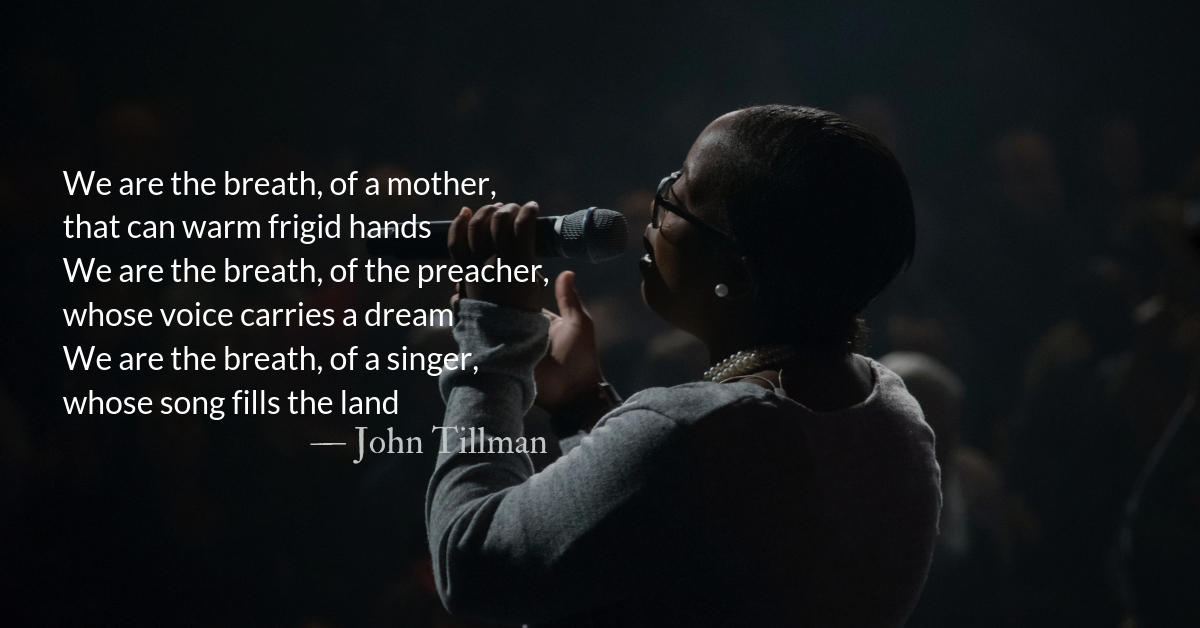Selected by reader, Steve Bostrom, from Helena, Montana
Typically, we view breath as insubstantial. This post significantly enlarges that thought. We go from ordinary breath to breath needed for a robust life envisioned by our Creator who breathed out not only sighs (Mark 7:34) but also gives his last breath on the cross so he can breathe upon us his invigorating Holy Spirit. Glory!
Scripture Focus: Psalm 144.3-4
Lord, what are human beings that you care for them,
mere mortals that you think of them?
They are like a breath;
their days are like a fleeting shadow.
John 3.5-8
Jesus answered, “Very truly I tell you, no one can enter the kingdom of God unless they are born of water and the Spirit. Flesh gives birth to flesh, but the Spirit gives birth to spirit. You should not be surprised at my saying, ‘You must be born again.’ The wind blows wherever it pleases. You hear its sound, but you cannot tell where it comes from or where it is going. So it is with everyone born of the Spirit.”
Reflection: Breath, Reconsidered :: Readers’ Choice
Originally published November 12th, 2018
By John Tillman
We rightly think of the psalmist comparing us to breath as humbling. But not everything that humbles humiliates. When humbled we are prepared to be lifted up, by God.
In Aramaic and Greek the word for “Spirit,” “breath,” and “wind” is the same word. This makes Christ’s conversation with Nicodemus one in which we must carefully attune our ears to context. Jesus is purposefully mixing his meanings. As Eugene Peterson rhetorically asks in his book, Christ Plays in Ten Thousand Places, “What’s being talked about here, breathing, or weather, or God?”
Although the length of a breath may be a humbling downside, perhaps, there is also an upside.
Breath, Reconsidered
Lord, what are we that you care for us?
We are like a breath.
Like a breath, Lord, we pass from the earth.
Like a breath, Lord, insubstantial we seem.
Like a breath, Lord, some deep and some shallow.
Like a breath, Lord, we dissipate in the breeze.
But you gave us breath,
Your mouth on Adam’s lips.
And you redeemed breath
When Christ first drew it in
And you received his breath,
When his Spirit he released
He gave that Spirit to us
When on the disciples he breathed…
We are Adam’s first breath,
His first breath, re-breathed.
We are like a breath, we are a beginning
We are like a breath the first sign of life
We are like a breath, divine inspiration
We are like a breath, a baby’s first cry
We are the breath, of a worker,
drawn to take strength
We are the breath, of a mother,
that can warm frigid hands
We are the breath, of the preacher,
whose voice carries a dream
We are the breath, of a singer,
whose song fills the land
Breath sustains symphonies
Breath extinguishes candles
Breath ignites embers
Breath powers prophets
Breath connects lovers
Breath fills balloons
Breath is life
Breath serenades
Breath enlightens
Breath enlivens
Breath laughs
Breath shouts
Breath prays
Breath fills
Breath comes
Breath goes
Lord, what are we that you care for us?
We are like a breath.
Divine Hours Prayer: The Request for Presence
O Lord, I call to you; my Rock, do not be deaf to my cry; lest, if you do not hear me, I become like those who go down to the Pit. — Psalm 28.1
– From The Divine Hours: Prayers for Summertime by Phyllis Tickle.
Today’s Readings
1 Samuel 15 (Listen – 5:46)
Romans 13 (Listen – 2:35)
Today’s Readings
1 Samuel 16 (Listen – 3:45), Romans 14 (Listen – 3:28)
1 Samuel 17 (Listen – 8:59), Romans 15 (Listen – 4:32)
Thank You!
Thank you to our donors who support our readers by making it possible to continue The Park Forum devotionals. This year, The Park Forum audiences opened 200,000 free, and ad-free, devotional content. Follow this link to join our donors with a one-time or a monthly gift.
Submit a Readers’ Choice
Let our community hear how your faith has grown. What post helped you heal?
Read more about He Stoops to Raise
He strips himself.
He lays aside
His Heaven
His throne
His clothes
His life







